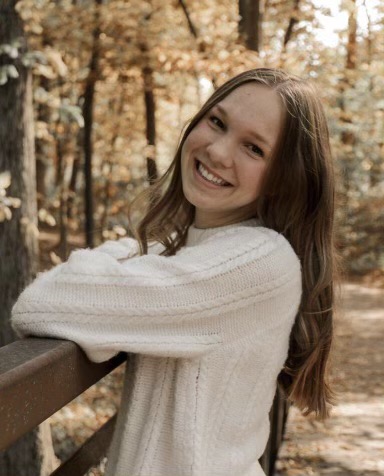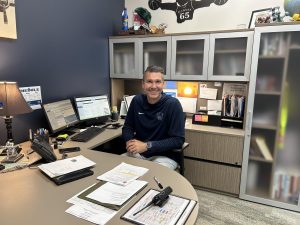Ditching Daylight Saving Time
Why we should change our clocks once in the spring, and then never change them again.
“Studies link the lack of sleep at the start of DST [daylight saving time] to car accidents, workplace injuries, suicide, and miscarriages.” – Time and Date
December 8, 2020
A Kansas autumn is like living in an episode of Gilmore Girls. The trees that line the neighborhoods turn to red, orange and yellow, their colorful leaves slowly dropping to float around in the perfect swirling breeze, creating a scene that closely resembles Stars Hollow. It’s not too hot, not too cold, just a perfect series of calm breezes that can be felt as the temperature rests around 64 degrees. There is, however, one major event that consistently puts a damper on all of this fall time tranquility, and that event is daylight saving time.
There are plenty, I mean plenty, of things the average student has to do after 5 o’clock, and it can be a great deal more difficult to focus on these things when the sky is dark, it feels like it’s 9 p.m., and all you want to do is cuddle up in a blanket and read a book. So why, on the first Sunday of November, does nearly the entire country continuously turn their clocks back? Well, it all began with a man in New Zealand who wanted to go bug hunting.

A Little History Lesson on Daylight Saving
George Hudson, an entomologist from New Zealand, was the first person recorded to have suggested the concept of setting the clock forward, in effort to create extra hours of sunshine in the evening so that he could have more time after work to study insects. His proposition for extra hours of daylight became a popular idea among many after him, but the idea was also widely rejected.
World War I is what ultimately spun us into this yearly routine, when Germany became the first country to declare a national daylight savings time. Their goal was to save energy and resources during the war by using less artificial lighting and having longer hours to work. Not wanting to be one-upped by Germany, almost every other country fighting in the war followed. This, eventually, included the United States.
By now you might be realizing that this explains why we set our clocks forward in the spring, to gain extra daylight hours, but not why we change them again in the fall only to lose those daylight hours. After all, it is called daylight saving not daylight losing. We spend eight months programming our bodies to believe the sky should get dark at around 9 o’clock every day, and then suddenly, by the fall, we continuously flip our daily routines and sleep-schedules completely out of whack. Sure, we know it’s coming, but that doesn’t mean our bodies don’t have to adjust, and for many that means losing a great deal of sleep, which can be a lot more detrimental than one might imagine.
Effects of Daylight Saving
Time changes affect the body’s circadian rhythms, essentially throwing off the body’s internal clock. This, according to Northwestern Medicine, can result in a number of health issues, including sleep deprivation, hormone imbalance, and even headaches, but it can also result in much more dangerous things.
According to Time and Date, “Studies link the lack of sleep at the start of DST [daylight saving time] to car accidents, workplace injuries, suicide, and miscarriages.”
The study showed that the sun going down earlier in the fall was linked to depression, and that, as far as car accidents go, gaining extra daylight in the spring resulted in 13% less pedestrian deaths.
Other harmful effects even include a rise in heart attacks in the week following the time change.
“Every year on the Monday after the springtime switch, hospitals report a 24% spike in heart attack visits around the US,” Business Insider said.
This goes to show how much even a little bit of sleep loss can affect the body and make it susceptible to disaster. However, the risks daylight saving presents do not stop at physical turmoil.
When it gets dark early, the crime rates go up. A study by the Stanford Institute for Economic Policy Research found that extending daylight helps to reduce crime, as criminals cannot operate as successfully in the daylight. Similarly, crime rates increase when the clock is set back in the fall. A study by The President and Fellows of Harvard College and the Massachusetts Institute of Technology showed a 7% decrease in robberies after gaining the extra daylight in the spring. Understandably so, it seems people are less willing to rob in broad daylight.
One final con to daylight saving time is that it actually costs a lot of money to change every clock. In 2013, American Enterprise Institute calculated that the opportunity cost (the cost of taking time that could be used for other, more productive things to change clocks instead) of changing clocks twice a year totals out to be about $2 billion annually.
“Although it is unclear what benefit Americans derive from adjusting their timepieces twice a year the costs they bear are clear,” economics professor Matthew Perry said.
What should be done about it?
The continuous practice of daylight saving is just a case of learned tradition that we would likely benefit from ending. While there have certainly been benefits in the extension of the daylight, they are wiped clean as soon as that hour is lost again. So, if anything, the next time our precious daylight comes back, maybe it shouldn’t be let go of ever again. This could be a world where daylight wouldn’t suddenly vanish every fall season, and there would be fewer dreaded mornings when you reluctantly have to pry your eyelids open and mourn the hour of sleep that was robbed from you. Society could sleep knowing it is overall healthier, happier, and, not to mention, significantly less likely to be robbed.


![“Studies link the lack of sleep at the start of DST [daylight saving time] to car accidents, workplace injuries, suicide, and miscarriages.” - Time and Date](https://owowlpost.com/wp-content/uploads/2020/12/daylight-savings-photo-900x600.jpg)




